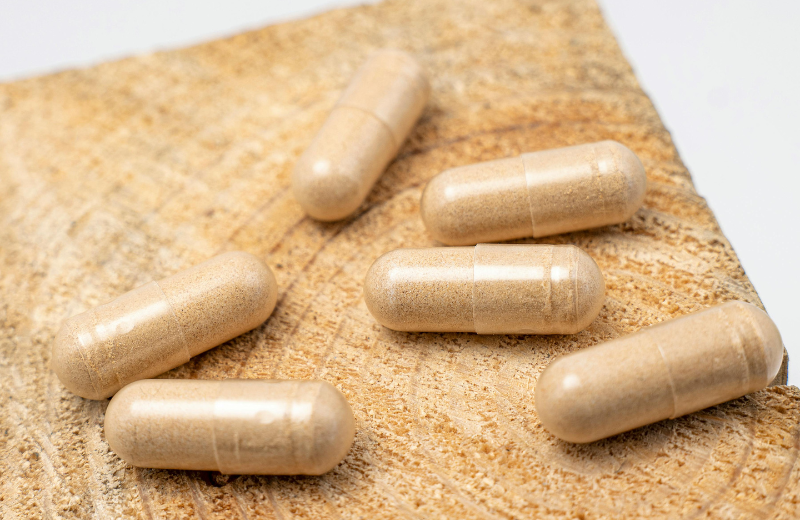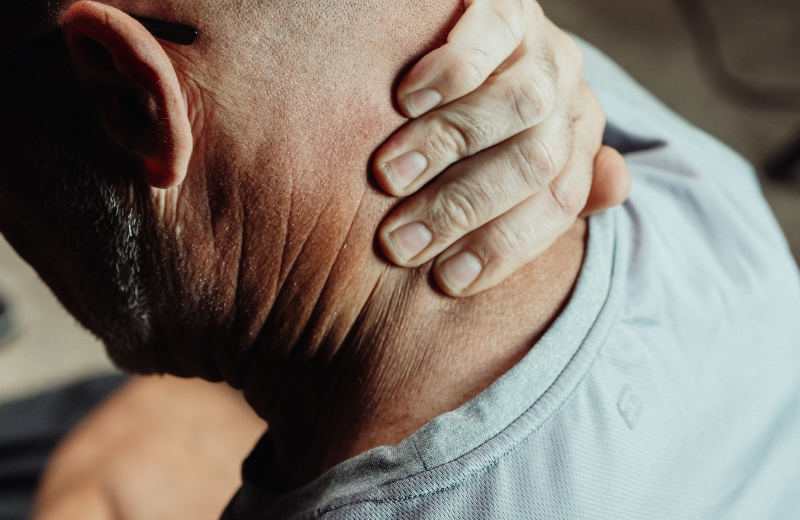If you’ve been exploring nootropic supplements or skin-enhancing products, you might have stumbled across something called DMAE. Whether you’re curious about its brain-boosting claims, wondering how it affects the skin, or trying to understand if it’s a safe supplement for you, this article breaks it all down.
Let’s explore what DMAE is, why people take it, what the potential benefits and side effects are, and whether it’s something that could fit into your own wellness routine.
This article is for informational purposes only and is not a substitute for professional medical advice, diagnosis, or treatment. Always consult with your GP or a qualified healthcare professional before starting any new herbal remedies, especially if you are pregnant, breastfeeding, taking medication, or managing a health condition.
Jump to:
- What is DMAE?
- The Benefits of DMAE
- What Types of DMAE Can You Take?
- What is the Best Form of DMAE to Take?
- How Much DMAE Should You Take, and When?
- The Best Time to Take DMAE
- What Are the Side Effects of DMAE?
- Who Should Avoid DMAE?
- Is DMAE Safe for Long-Term Use?
- Other Common Questions About DMAE
- Study Our Master Herbalist Diploma for £29
Recommended for you!
Best SellersWhat is DMAE?
DMAE stands for dimethylaminoethanol, sometimes found in its supplement form as dimethylaminoethanol bitartrate. It’s a compound naturally produced in small amounts in the human brain and is also found in certain types of fish, such as sardines and anchovies.
The definition of DMAE is a compound involved in the production of acetylcholine, a neurotransmitter that plays a key role in memory, learning, and mood. Because of this, many believe that DMAE supplements may help support brain health and improve cognitive function.
DMAE is available in various forms, including capsules, tablets, serums, and DMAE powder, each suited to different purposes – from mental clarity to firmer-looking skin.
The Benefits of DMAE

People take DMAE for a variety of reasons. Here are some of the most common benefits that have been associated with the supplement DMAE:
1. Improved Mental Focus and Clarity
DMAE is often used as a nootropic, a supplement that may help improve brain performance. Users commonly report feeling more alert, focused, and mentally sharp when taking it. This is likely due to its connection to acetylcholine production, which is key to cognitive function. Some users say it gives them a sense of mental clarity that helps with concentration and productivity throughout the day.
Some people explore DMAE for ADHD support. While it’s not a mainstream treatment, anecdotal evidence suggests it might help manage symptoms like inattentiveness and distractibility. However, more research is needed to confirm its effectiveness in this area. People who use it for this purpose often pair it with other focus-enhancing strategies.
2. Mood and Emotional Wellbeing
By supporting neurotransmitter activity, DMAE might help enhance your mood and reduce mild feelings of anxiety or low energy. For some, this translates into feeling more motivated or emotionally balanced throughout the day. These subtle emotional lifts can make daily challenges feel more manageable.
3. Skin Firmness and Anti-Ageing
DMAE is often featured in skincare, particularly in serums and creams marketed for anti-ageing. It’s believed to help tighten and tone the skin, reducing the appearance of fine lines and sagging. Some studies and user testimonials note improvements in firmness and texture, making it a popular addition to beauty routines. Regular use may lead to a smoother, more lifted appearance, particularly in areas prone to sagging.
4. Anti-Inflammatory Potential
There’s some discussion around whether DMAE may have anti-inflammatory properties. This would suggest a potential role in reducing oxidative stress and supporting general wellness, although scientific backing here is still limited. Some researchers speculate it could have a calming effect on inflammation-related skin issues or internal processes, but more studies are needed to confirm this.
What Types of DMAE Can You Take?

DMAE is available in several different forms, giving you the freedom to choose the one that best fits your health goals, preferences, and daily habits. Each format has its own advantages and can be easily included in your wellness routine.
You can find DMAE in capsules, tablets, powders, liquid tinctures, topical creams, and even as part of skincare blends. While some forms are preferred for their cognitive support and nootropic benefits, others are ideal for anti-ageing skincare, making DMAE a versatile addition to both internal and external health practices.
What is the Best Form of DMAE to Take?
- Capsules and Tablets: DMAE capsules and tablets are among the most widely used and convenient options. They offer precise DMAE dosage and are ideal for daily cognitive support or those looking for help with focus and mental clarity. This form is popular for people taking DMAE for ADHD or general brain enhancement.
- Powders: DMAE powder can be mixed into smoothies, water, or juice, allowing you to adjust your dose to suit your needs. This is a good choice if you prefer to personalise your intake or blend your supplements with other nootropics like choline or L-theanine.
- Tinctures: DMAE tinctures are liquid extracts that can be taken under the tongue or diluted in water. This format may offer faster absorption, making it useful if you’re looking for quick support for mental focus or alertness. It’s also a convenient way to control your intake without swallowing pills. Discover how to make your own herbal tinctures.
- Topical Creams and Serums: DMAE is widely used in skincare products designed to firm and tone the skin. When applied topically, it may help improve skin elasticity and reduce the appearance of fine lines. This makes it popular for those seeking anti-ageing benefits or tighter, more youthful-looking skin.
- Injections: In clinical or cosmetic settings, DMAE injections may be used to achieve targeted results, particularly for skin firming. This form is typically administered by professionals and is chosen for its more intensive effect, though it’s not widely used outside specialist environments.
How Much DMAE Should You Take, and When?

The right DMAE dosage depends on your goals, the form you’re using, and how your body responds. Below are common guidelines:
- Capsules/Tablets: Most supplements suggest between 100 mg and 300 mg of DMAE dimethylaminoethanol daily. Always follow the product’s label, and if you’re new to DMAE, begin with the lower end of the range to assess tolerance.
- Powder: With dimethylethanolamine supplement powder, start with around 100 mg mixed into a drink. This can be adjusted slightly as you become more familiar with how your body reacts. Avoid exceeding recommended amounts, as DMAE is potent.
- Tinctures: For liquid tinctures, 1–2 ml per day is typical, often split between morning and afternoon doses. Place the drops directly under the tongue for quicker absorption or mix with water if preferred.
- Topical Products: Apply according to product instructions, usually once or twice daily to cleansed skin. DMAE creams are often used on the face and neck to help firm and smooth the skin’s appearance.
- Injections: Dosing is handled by trained professionals based on individual needs and should never be attempted without proper guidance. The effects are typically more noticeable but come with added risks and costs.
The Best Time to Take DMAE
DMAE supplements are best taken in the morning or early afternoon. Because they can increase mental energy and alertness, taking them late in the day may affect your sleep. People often report feeling a noticeable cognitive boost shortly after taking DMAE, so timing it before tasks that require focus, like work, studying, or creative activities, can be especially beneficial.
If you’re using DMAE to support workouts, consider taking it about 30–60 minutes before exercise for a potential lift in motivation and mental drive. For general use, a consistent morning dose is effective for sustaining clarity throughout the day.
What Are the Side Effects of DMAE?

Common DMAE side effects are generally mild and tend to appear when the supplement is taken in high doses or without proper guidance. Most people tolerate DMAE supplements well when following recommended amounts. However, in some cases, you may experience:
- Headaches or tension in the head and neck
- Insomnia or disrupted sleep, especially if taken too late in the day
- Muscle twitching or restlessness
- Digestive discomfort, such as nausea or bloating
- Mood changes, such as irritability or low mood in sensitive individuals
DMAE interacts with brain chemistry and affects neurotransmitter levels, particularly acetylcholine. While this can enhance focus and memory, these changes may occasionally result in unwanted effects, especially if your dosage is too high or you're sensitive to nootropics. Starting with a low dose and monitoring your body's response can help reduce the likelihood of negative reactions.
Who Should Avoid DMAE?
Some people should avoid taking DMAE dimethylaminoethanol, especially without medical supervision. Pregnant and breastfeeding women are advised to steer clear due to insufficient safety data and the potential impact on developing nervous systems. Those with conditions such as epilepsy or bipolar disorder should also avoid DMAE, as it may increase the risk of seizures or mood disturbances.
If you’re taking medications, especially antidepressants, stimulants, or drugs affecting brain chemistry, consult your doctor first, as DMAE may interact with them. Additionally, if you’ve ever had an adverse reaction to nootropic compounds or dimethylethanolamine supplements, it's best to be cautious.
People who are highly sensitive to stimulants may find DMAE overly energising or mentally overstimulating. If you experience heightened anxiety, agitation, or difficulty sleeping, reducing your dose or discontinuing use might be necessary.
Is DMAE Safe for Long-Term Use?
For healthy adults using DMAE supplements within the suggested guidelines, short to medium-term use is generally considered safe. However, the long-term effects of daily DMAE intake haven’t been thoroughly researched, so a cautious approach is recommended.
To reduce the risk of side effects and help your body maintain sensitivity to the supplement, many users choose to take DMAE in cycles, such as using it for several weeks followed by a short break. This practice may prevent tolerance build-up and give your system time to reset.
As with any supplement, it’s important to tune into how your body feels over time and to seek advice from a healthcare professional if you notice any unusual symptoms or have pre-existing conditions. Your safety and well-being always come first when adding something new to your routine.
Recommended for you!
Best SellersOther Common Questions About DMAE
Is DMAE Banned?
DMAE is legal in many countries and available over the counter, but some athletic organisations have banned it due to its stimulating properties. If you’re an athlete, check with your sport’s guidelines.
Does DMAE Help Hair Growth?
There’s not enough evidence to confirm DMAE as a reliable hair growth treatment. Some skin-related products include it for firming benefits, but its direct effect on hair remains unclear.
Can DMAE Cause a False Positive?
Some online forums mention concerns about false positives on drug tests. While there’s little formal evidence to support this, it’s best to be cautious and inform your tester if you're using supplements.
Can I Use DMAE with Retinol?
DMAE is often combined with retinol in skincare products. However, both can be potent, so patch-testing or alternating their use can help avoid irritation.
What Does DMAE Do to the Brain?
DMAE’s primary role is to support the production of acetylcholine, a neurotransmitter essential for attention, memory, and muscle function. That’s why it’s often taken for mental clarity and focus.
What Does DMAE Do for Working Out?
While not a traditional pre-workout, some users say DMAE gives them a mental edge during training by boosting motivation and alertness.
Does DMAE Raise Blood Pressure?
This isn’t commonly reported, but if you have concerns or are on blood pressure medication, consult your doctor before use.
What Are the Benefits of DMAE Injections?
DMAE injections are sometimes used cosmetically to tighten skin and reduce wrinkles. These are typically done by professionals and may offer more immediate results than topical creams, but come at a higher cost and with additional risks.
How Much DMAE for ADHD?
Studies exploring DMAE for ADHD used dosages between 300–500 mg daily, though this is not yet a mainstream or medically approved treatment. Always talk to a professional before trying DMAE in this context.
Study Our Master Herbalist Diploma for £29
If you’ve found yourself fascinated by the potential of DMAE and other natural remedies, why not deepen your understanding? Whether you're a beginner or looking to expand your knowledge, Centre of Excellence offers a comprehensive Master Herbalist Diploma Course, designed for people of all levels.
The course covers everything from herb identification and preparation to building herbal blends for specific emotional and physical needs. Follow the link to access the course for just £29!












